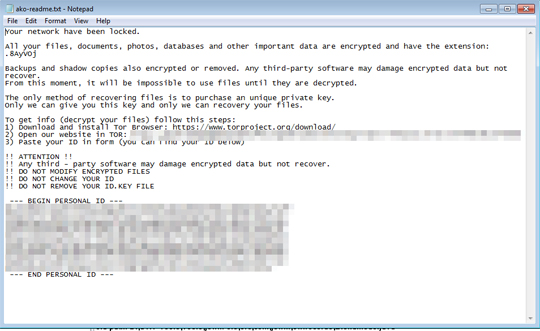Ransom.Win32.AKOLOCKER.A
Trojan.Win32.DelShad.cbx (Kaspersky); Ransom:Win32/MedusaLocker!MTB (Microsoft)
Windows


Threat Type: Ransomware
Destructiveness: No
Encrypted:
In the wild: Yes
OVERVIEW
This Ransomware arrives on a system as a file dropped by other malware or as a file downloaded unknowingly by users when visiting malicious sites.
It drops files as ransom note. It avoids encrypting files with the following file extensions.
TECHNICAL DETAILS
Arrival Details
This Ransomware arrives on a system as a file dropped by other malware or as a file downloaded unknowingly by users when visiting malicious sites.
Installation
This Ransomware drops the following files:
- {Encrypted Path}\id.key → encryption key
- {Encrypted Directory}\ako-readme.txt → ransom note
It adds the following processes:
- vssadmin.exe Delete Shadows /All /Quiet
- bcdedit.exe /set {default} recoveryenabled No
- bcdedit.exe /set {default} bootstatuspolicy ignoreallfailures
- wbadmin DELETE SYSTEMSTATEBACKUP
- wbadmin DELETE SYSTEMSTATEBACKUP -deleteOldest
- wmic.exe SHADOWCOPY /nointeractive
Other System Modifications
This Ransomware modifies the following registry keys:
HKEY_LOCAL_MACHINE\SOFTWARE\Microsoft\
Windows\CurrentVersion\Policies\
System
EnableLinkedConnections = 1
Other Details
This Ransomware adds the following registry keys:
HKEY_CURRENT_USER\Software\akocfg
aid = .{Appended File Extension}
It does the following:
- List all network adapters and it's associated IP addresses
- Tor payment site for the ransomware:
- http://{BLOCKED}hkidrby4mccwqpds5za6uo2thcw5gz75qncv7rbhyad.onion/{BLOCKED}U3PNABN
Ransomware Routine
This Ransomware avoids encrypting files with the following strings in their file path:
- $
- AppData
- Program Files
- Program Files (x86)
- AppData
- boot
- PerfLogs
- ProgramData
- Intel
- Microsoft
- Application Data
- Tor Browser
- Windows
It appends the following extension to the file name of the encrypted files:
- .{6 random characters}
It drops the following file(s) as ransom note:
- {Encrypted folder path}\ako-readme.txt
It leaves text files that serve as ransom notes containing the following text:
It avoids encrypting files with the following file extensions:
- .exe
- .dll
- .sys
- .ini
- .lnk
- .key
- .rdp
SOLUTION
Step 1
Trend Micro Predictive Machine Learning detects and blocks malware at the first sign of its existence, before it executes on your system. When enabled, your Trend Micro product detects this malware under the following machine learning name:
-
Troj.Win32.TRX.XXPE50FFF033
Step 2
Before doing any scans, Windows 7, Windows 8, Windows 8.1, and Windows 10 users must disable System Restore to allow full scanning of their computers.
Step 3
Note that not all files, folders, and registry keys and entries are installed on your computer during this malware's/spyware's/grayware's execution. This may be due to incomplete installation or other operating system conditions. If you do not find the same files/folders/registry information, please proceed to the next step.
Step 4
Restart in Safe Mode
Step 5
Delete this registry key
Important: Editing the Windows Registry incorrectly can lead to irreversible system malfunction. Please do this step only if you know how or you can ask assistance from your system administrator. Else, check this Microsoft article first before modifying your computer's registry.
- In HKEY_CURRENT_USER\Software\akocfg
- aid = ".{Appended Extension}"
- aid = ".{Appended Extension}"
Step 6
Restore these modified registry values
Important:Editing the Windows Registry incorrectly can lead to irreversible system malfunction. Please do this only if you know how to or you can seek your system administrator's help. You may also check out this Microsoft article first before modifying your computer's registry.
- In HKEY_LOCAL_MACHINE\SOFTWARE\Microsoft\Windows\CurrentVersion\Policies\System
- EnableLinkedConnections = From: "1" To: "{Default}"
- EnableLinkedConnections = From: "1" To: "{Default}"
Step 7
Search and delete these files
- {Encrypted Path}\id.key
- {Encrypted Directory}\ako-readme.txt
Step 8
Enabling Volume Shadow Service
- Run the command prompt (cmd.exe) as administrator.
- Enable Volume Shadow Service by typing the following command:
net start vss
Step 9
Enabling Windows Error Recovery
- Run the command prompt (cmd.exe) as administrator.
- Enable Windows Error Recovery Screen on Startup by typing the following command:
bcdedit /set {default} bootstatuspolicy displayallfailures
Step 10
Restart in normal mode and scan your computer with your Trend Micro product for files detected as Ransom.Win32.AKOLOCKER.A. If the detected files have already been cleaned, deleted, or quarantined by your Trend Micro product, no further step is required. You may opt to simply delete the quarantined files. Please check this Knowledge Base page for more information.
Step 11
Restore encrypted files from backup.
Step 12
Scan your computer with your Trend Micro product to delete files detected as Ransom.Win32.AKOLOCKER.A. If the detected files have already been cleaned, deleted, or quarantined by your Trend Micro product, no further step is required. You may opt to simply delete the quarantined files. Please check the following Trend Micro Support pages for more information:
Did this description help? Tell us how we did.



